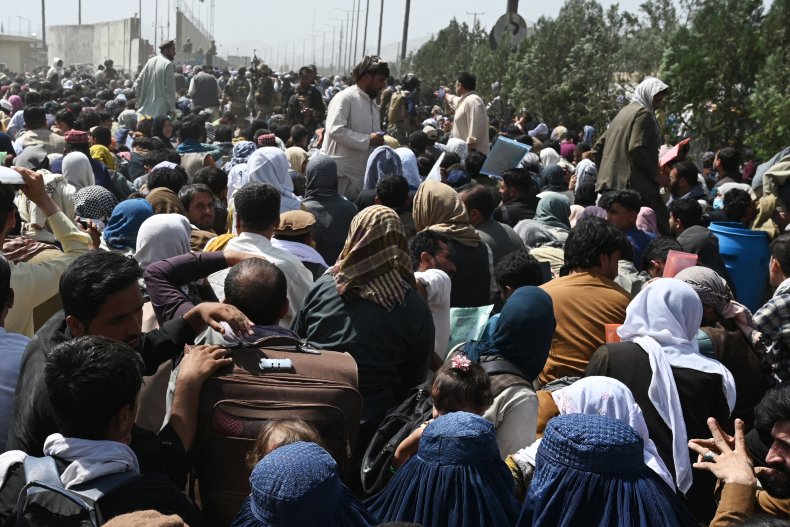NOAH ROTHMAN
We have to go back about a week, which was the culmination of the Taliban's advance following our gradual and precipitous withdrawal, beginning in May and culminating in July. We saw a profound amount of fighting around provincial capitals culminating in the seize of Kandahar, which compelled the Biden administration to re-engage in the region to again and execute airstrikes, which they stopped doing.
That was ineffective: Kandahar fell, and then subsequently, every other provincial capital fell over the weekend, proceeding Kabul's collapse. Friday night, the Afghan National Army essentially dissolved, and we witnessed Taliban fighters take the capital city basically unmolested—an open city, practically.
In the days that have followed, we have seen a nightmarish series of consequences due to this policy. I would take a 30,000-foot perspective and say that advocates on the right and the left for American retrenchment from Afghanistan have seen what many of us who opposed that policy warned: more war, not less; larger troops deployments to Afghanistan, not fewer; a vastly better-armed terrorist-supporting state, not more than American Security; advanced offensive weaponry in Taliban hands, which has not renounced ties to Al Qaeda and which American planners now believe will become home and host to insurgent groups; and terrorist groups that want to export terrorism.
European allies are vocally attacking the United States as a NATO ally for abandoning them and leading them into a morass. And American citizens—up to 15,000—are stranded and helpless and at the mercy of this terrorist organization.
It is a colossal national security crisis and the Biden administration's response so far has been to pretend that it's not. And that's just not catching on.
All Joe Biden had to do was nothing at all. He inherited a peace deal that Donald Trump negotiated for him in 2020. And that peace deal contributed perhaps to the intangibles associated with the loss of momentum established for the Afghan National Army and the Afghan government; American support for their state was finite, which can have a demoralizing effect. Although it's an intangible thing, it's hard to quantify.
But what Joe Biden had to do was maintain what he inherited. He inherited a very modest footprint, American troops, to the tune of 253,000 operating from within bases behind high walls.
For years prior to withdrawal, you heard Afghans talk about how it was difficult to find an American on the streets, quite unlike, for example, Russians, who were everywhere. You just couldn't find an American. They just were hard to see because they were operating from behind U.S. bases, maintaining close air support and executing drone strikes.
And that was the mission in Afghanistan. It was affordable. It was not costly in terms of lives or dollars. The consequences of withdrawal is everything that everybody said they didn't want: larger deployments, more destabilization and a greater terror threat according to the United States government.
So yes, what the Biden administration could have done is nothing. Second, if they were inclined to pursue this Trump policy, they could have done so with even the most modest amount of foresight. We evacuated the military before we evacuated our civilians. That is a recipe for disaster; just on an intuitive level, you don't have to have epaulets or brass to know that that would be a disaster. Joe Biden went off on a bunch of nonsensical tangents about how our SIV's and the Afghan government didn't want to get out. They didn't want to have a panic or something along those lines. The backlog of SIVs is tens of thousands of people long and is probably shorter than it should be. He said the Afghan people didn't fight they didn't want to fight, they didn't have the will to fight.
We engineered this debacle. It's not as though this happened entropically. We cut off air support around Kandahar and recommitted to it only at the 11th hour, and it was insufficient. We cut off the capacity of support staff to maintain vehicles, maintain helicopters, and to the extent the Afghan Air Force exists, grounding it. And then we say, "Oh, they don't want to fight for us right now." At this very minute, 600 Afghan soldiers loyal to the Ashraf Ghani regime are helping us secure this commercial airport allowing us to evacuate Americans. They're helping us right now.
It's an outrageous slander against our allies, and one that will have reverberating effects across the planet earth, as revanchist and irredentist powers, in places like Beijing and Moscow, wonder if the United States would go to war for the sovereignty of Taipei or Tala.
Would they? I don't know. I don't really think they would. And I can guarantee you that the Kremlin and Beijing are thinking the exact same thing at this very minute.
 Afghans gather on a roadside near the military part of the airport in Kabul on August 20, 2021, hoping to flee from the country after the Taliban's military takeover of Afghanistan.WAKIL KOHSAR/AFP VIA GETTY IMAGES
Afghans gather on a roadside near the military part of the airport in Kabul on August 20, 2021, hoping to flee from the country after the Taliban's military takeover of Afghanistan.WAKIL KOHSAR/AFP VIA GETTY IMAGES
No comments:
Post a Comment